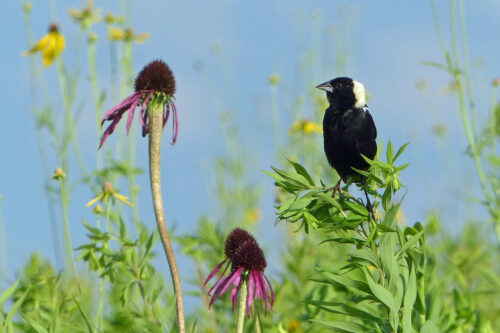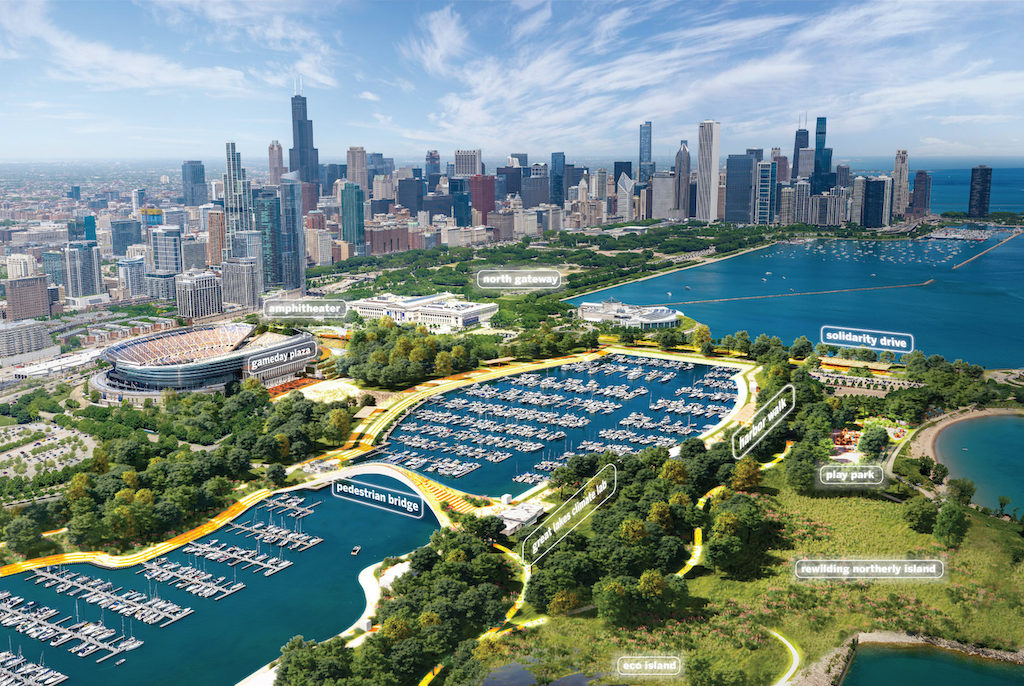
BY JUDY CARMACK BROSS
With this interview with Jerry Adelmann, ecological activist and visionary president and CEO of Openlands, we begin a two-part series on the innovative leadership of this almost 60-year-old non-profit working in the metropolitan Chicago region (and sometimes nationally and even across the globe).
We always hear the first part of Daniel Burnham’s “make no little plans” when his mandate for Chicago is celebrated, but what follows in that famous pronouncement aptly fits the current vision for the re-wilding of the museum campus: “Make big plans, aim high in hope and work, remembering that a noble, logical diagram once recorded will never die, but long after we are gone will be a living thing, asserting itself with ever growing insistency.”
As heads of the museums on the Museum Campus, Openlands President and CEO Jerry Adelmann, and other business leaders came together over the spring, big plans emerged that go far beyond the narrowly defined areas around the Field Museum, Shedd Aquarium, The Adler Planetarium, and Soldier Field. Northerly Island will now be incorporated, west to DuSable Lake Shore Drive and south to the McCormick Bird Sanctuary, integrating with the entire lakefront from Grant Park, through the Burnham Wildlife Corridor, to the Obama Presidential Center, and beyond.
“The re-wilding of the campus also includes Northerly Island where Jeanne Gang’s brilliant green vision has only partially been implemented and accessibility can be difficult if you’re not driving. It involves the restoring of the ecological integrity of site as an outdoor laboratory of nature-based solutions to climate change,” Adelmann says.
“The plan will create much-needed habitat for migrating birds, and a nature sanctuary,” he continues. “The terminal at Northerly Island is ideally situated to become an environmental learning center, a Great Lakes climate lab. It would bring in multiple partners such as local universities, non-profits, and regional and national leaders. Where else can you find world-class museums that interpret earth, heavens, and water on one campus surrounded by the native beauty of the prairie?”
Adelmann envisions not only outdoor labs at Northerly Island but also an increased opportunity for youth camping and stargazing events.
Traffic jams around the museums, excessive parking areas, and the lack of good signage are among the issues that faced the group: “Plans must include increased accessibility and transportation solutions, particularly for communities to the west. How we get people there is crucial to its success. The plan calls for pedestrian and bike connections across DuSable Lake Shore Drive, including access to Northerly Island from the 18th Street bridge and Waldron Drive. In addition, it recommends dependable bus, trolley, and bike options be available to all Chicagoans year-round so it can be a place everyone can enjoy. This plan is just a first step. To ensure access and equity are centered, the City’s next steps must include broad public engagement leading to a comprehensive overall plan that makes the campus inviting to all Chicagoans and visitors.”
Adelmann explains that federal money will hopefully be available for some parts of the project: “It is an opportunity for private foundations and families to see this vision through together.”
And a large part of this vision is the integration of nature-based solutions to issues like climate change, including tangible, more immediate projects like addressing the climate resiliency of our roads through improving the quality of asphalt surfaces.
Planned restoration extends from city streets to grasslands: “Illinois is called the Prairie State but less than one one-hundredth of one percent of the original prairie survives. We must replace turf grass in certain places with natural plants and get carbon back into the ground. Grasslands like Illinois’s native prairies have a large impact in the service of ecology: reducing flooding, providing habitat for birds and other pollinators, and improving soil quality in our region,” Adelmann explains.
Restoring land to its natural state, like at Museum Campus, is in line with national and international conservancy efforts. Internationally regarded for his accomplishments in that field, Adelmann is also working on the 30×30 Campaign for Nature, which seeks to protect or restore 30 percent of our global lands and waters by 2030. The plan has received support from 100 countries who have committed to the goal to date.
“At Openlands we feel that nature is important to all people and on all scales, whether you are planting a tree in your yard, taking a recreational trail, or spending time at your local park,” he shares. “One of the few reliefs from COVID was seeking solace outdoors and having an awareness of nature in our lives. Chicago can be a real leader on an international scale through initiatives like the revisioning of Museum Campus. We can join cities like Barcelona, Paris, London, and Montreal, which are committing to bringing back woodlands and green spaces in a large portion of their urban spaces.
“Where do we live today? Some 80 percent of the US population lives in metropolitan areas—cities can and should be leaders in addressing climate change. We can develop our own holistic approach, focusing on a green vision for our whole area, working with other stakeholders and private property owners.”
On October 21, Openlands will host its annual luncheon when Marshall Johnson, Chief Conservation Officer of the National Audubon Society, will speak on the importance of grasslands. Adele Simons, an early and consistent champion of the environment and the importance of working globally to fight climate change, will receive their award that day.
The second president of the John D. and Catherine T. MacArthur Foundation, Simmons chaired the 2010 Chicago Climate Action Plan and the Global Philanthropy Project, and served as vice-chairman of Chicago Metropolis 2020, among many other leadership roles.
For further information about the October 21st luncheon and how you can get involved with the many projects at Openlands, visit openlands.org.












